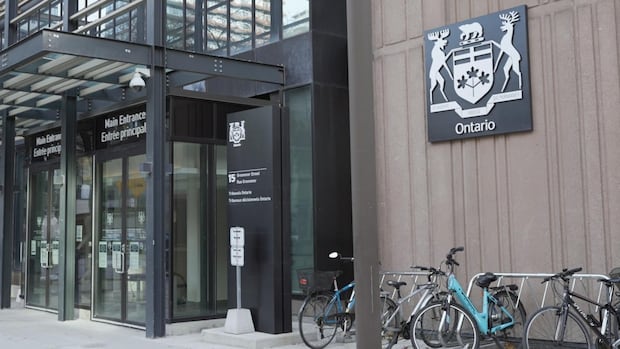Tenant advocates in Toronto say they’re seeing more cases of landlords filing eviction notices against tenants for not paying their rent, even when the rent has been paid in full.
Tenants’ rights groups ACORN and the Advocacy Centre for Tenants Ontario (ACTO) said they’ve been seeing more meritless eviction applications lately, but did not provide specific figures.
Lawyer Marc Goldgrub, who represents several tenants, says he wants Ontario’s Landlord and Tenant Board to start cracking down on landlords who file frivolous claims.
“There’s no cost, there’s no punishment, there are no consequences for the landlord for everything they’ve put the tenant through, and this costs the tenants thousands,” he said.
“If I’m seeing three or four cases in the last two years, there must be dozens, hundreds of others,” Goldgrub said.
As for the reasons why landlords are filing bogus claims, Goldgrub said he believes they’re doing so in the hope that the tenant simply won’t show up at an LTB hearing or will be scared away by the stress and legal fees associated with fighting eviction applications at the board.
Under provincial rules, a landlord can’t increase residential rents by more than 2.5 per cent a year in most cases. But if a tenant leaves voluntarily, the landlord can raise the rent to whatever he or she wants.
Advocate points to provincial ‘loophole’
Douglas Kwan, director of legal services for ACTO, said that clause provides landlords with “a loophole.”
“Landlords who may have fallen into a situation where they may have made a bad investment see that loophole, and are trying to utilise that by serving meritless notices of termination on tenants hoping…the tenants will give up, move out, and then they can rent that unit at whatever rent they desire,” he said. “This is something that we’re seeing, and we’re seeing more of.”
CBC Toronto has contacted the province for a response.
CBC Toronto also asked the LTB for stats on the number of bogus evictions they’re seeing, but did not receive a reply.
Sara Basso, who’s lived in a Gloucester Street low-rise near Yonge and Wellesley streets for 15 years, believes she’s been the target of a meritless eviction application.

In January, she received a copy of the application, filed with the LTB, claiming she’d been ignoring rent increases for years and was now thousands of dollars in arrears, she said.
The landlord withdrew the eviction application after Goldgrub showed the LTB adjudicator there was no proper notice of a rent increase, and provided bank statements showing Basso had been paying her rent all along.
“It was incredibly stressful. It was a financial burden,” said Basso, who says she’s spent “thousands” in legal fees fighting the application.
Harold Pizel, president of Skywater Property Management, which operates the Gloucester Street building, told CBC Toronto in an email the dispute was “a misunderstanding.”
‘This is ridiculous’
Goldgrub and Kwan both said there should be repercussions for landlords who misuse the process.
“One would think, given the LTB’s infamous backlog, that adjudicators would be furious for the time and resources wasted by these garbage applications,” Goldgrub wrote in an article published on Openroom, a portal that provides rental records of both landlords and tenants.
“In reality, adjudicators just dismiss the case or let the landlord withdraw the application as if it’s no harm, no foul.
“This is ridiculous,” he wrote. “While the costs involved in these cases are negligible for large corporate landlords, for tenants they can be crushing and the experience is harrowing.”

Kwan noted that the LTB is empowered to levy fines of up to $35,000 per application, but rarely does.
He said the situation has become worse since COVID struck, and LTB adjudicators began holding hearings virtually across the province, rather than in person in their home regions, which allowed them to get to know landlords’ representatives and more easily differentiate between vexatious claims and legitimate ones.
CBC Toronto asked the LTB to respond to Goldgrub’s suggestions but did not receive a reply.
Crackdown on landlords not needed, says one
But landlords groups who spoke with CBC Toronto denied there is widespread abuse of the process.
Christian Szpilfogel, a landlord who also sits on the board of a trade organization called Rental Housing Canada, said it’s in a landlord’s best interests to play by the rules.
“They simply wouldn’t risk their reputations on doing something, quite frankly, underhanded like this,” he said. “It could be happening here and there, but I don’t see it as pervasive. I’d be really upset if I saw something like that.”
Tony Irwin, president and CEO of the Federation of Rental-Housing Providers of Ontario, said in an email to CBC Toronto that his organization’s members also adhere to the rules.
“While human error can occur on both sides, professional rental housing providers utilize internal systems that maintain accurate records,” the email states. “We encourage our members to resolve issues with their residents through open communication, and to only pursue an LTB application as a last resort.
Szpilfogel said the current system of administrative fees levied by the board for wrongdoing is working. He said he doesn’t believe a crackdown on landlords is warranted since the board’s tribunals “don’t really fine or penalize tenants who lie or perjure themselves.”







